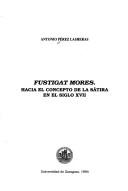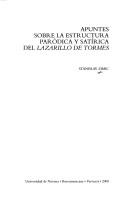| Listing 1 - 6 of 6 |
Sort by
|
Book
ISBN: 3954879026 848489147X Year: 2005 Publisher: Iberoamericana Editorial Vervuert
Abstract | Keywords | Export | Availability | Bookmark
 Loading...
Loading...Choose an application
- Reference Manager
- EndNote
- RefWorks (Direct export to RefWorks)
En doble perspectiva se analiza en primer lugar la sátira española situándola dentro del contexto europeo y después la publicación periódica más influyente y representativa de la Ilustración española, "El Censor".
Satire, Spanish --- Spanish satire --- Spanish wit and humor --- History and criticism. --- Spanish literature
Book
ISBN: 1442697091 1442697547 9781442697096 9781442697546 9780802099525 0802099521 Year: 2009 Publisher: Toronto
Abstract | Keywords | Export | Availability | Bookmark
 Loading...
Loading...Choose an application
- Reference Manager
- EndNote
- RefWorks (Direct export to RefWorks)
The Laughter of the Saints examines this rich carnivalesque tradition of parodied holy men and women and traces their influence to the anti-heroes and picaresque roots of early modern novels such as Don Quixote.
Christian saints in literature. --- Spanish fiction --- Antiheroes in literature. --- Satire, Spanish --- Spanish satire --- Spanish wit and humor --- History and criticism. --- Spanien. --- Spanien --- Isbāniyā --- Spain --- Espagne --- Estado Español --- España --- Espanja --- Hispania --- Spanier --- Iberische Halbinsel

ISBN: 8477334072 Year: 1994 Publisher: Zaragoza : Universidad de Zaragoza,
Abstract | Keywords | Export | Availability | Bookmark
 Loading...
Loading...Choose an application
- Reference Manager
- EndNote
- RefWorks (Direct export to RefWorks)
Non-fiction --- Spanish literature --- anno 1600-1699 --- 860 "15/16" --- 860-7 --- Satire --- -Satire, Spanish --- -Spanish satire --- Spanish wit and humor --- Comic literature --- Literature --- Wit and humor --- Invective --- Spaanse literatuur--?"15/16" --- Spaanse literatuur: humor; satire --- History and criticism --- Satire, Spanish --- History and criticism. --- -Spaanse literatuur--?"15/16" --- 860-7 Spaanse literatuur: humor; satire --- 860 "15/16" Spaanse literatuur--?"15/16" --- -860-7 Spaanse literatuur: humor; satire --- Spanish satire --- LITTERATURE ESPAGNOLE --- SATIRE --- 17E SIECLE
Book
ISBN: 1855662892 9781855662896 9781782046974 1782046976 Year: 2015 Publisher: Woodbridge, Suffolk, UK Tamesis
Abstract | Keywords | Export | Availability | Bookmark
 Loading...
Loading...Choose an application
- Reference Manager
- EndNote
- RefWorks (Direct export to RefWorks)
Since Carajicomedia was published in 1519, it has been largely ignored by critics because of its strong sexual content. The author of Carajicomedia: Parody and Satire in Early Modern Spain believes that it is a sophisticated and complex composition that provides as good a vantage point from which to examine the ideology of the period as does La Celestina. In their poems, the writers of Carajicomedia inadvertently reveal the deep worries of the knights and nobles who opposed the regencies of Ferdinand the Catholic and Francisco Jiménez de Cisneros pending the arrival of Charles V. Carajicomedia is therefore a harbinger of the War of the Comuneros, the great popular revolt that convulsed Spain in 1520. In this book's chapters, the author examines the parodic relationship between the text of Juan de Mena's El Laberinto de Fortuna, the glosses of Hernán Nún̋ez's Las Trezientas, and Carajicomedia. He then turns to its actual writers and their settings, and shows how their satirical attitudes towards males, females, and conversos reveals the failure of the societal mechanisms in place to control desire and miscegenation. Carajicomedia: Parody and Satire in Early Modern Spain concludes with a paleographic edition of the text and appendices that contain a modern Spanish version and its English translation, as well as examine Carajicomedia's language.
Poésie espagnole. --- Poésie érotique espagnole. --- Poésie humoristique espagnole. --- Mena, Juan de, --- Spanish poetry --- Parodies, Spanish --- Satire, Spanish --- Humorous poetry, Spanish --- Erotic poetry, Spanish --- History and criticism. --- Carajicomedia. --- 1500 - 1700 --- Spanish erotic poetry --- Spanish humorous poetry --- Spanish wit and humor --- Spanish parodies --- Spanish satire --- Classical Period --- Early Modern Period --- Cultural Satire. --- Early Modern Period. --- Early Modern Spain. --- Literary Analysis. --- Literary Genres. --- Literary Themes. --- Literary Work. --- Parody. --- Satire. --- Spanish Culture. --- Spanish Humor. --- Spanish Literature.
Book
ISBN: 9780802099525 0802099521 1442697091 1442697547 Year: 2009 Publisher: Toronto, [Ontario] ; Buffalo, [New York] ; London, [England] : University of Toronto Press,
Abstract | Keywords | Export | Availability | Bookmark
 Loading...
Loading...Choose an application
- Reference Manager
- EndNote
- RefWorks (Direct export to RefWorks)
The Laughter of the Saints examines this rich carnivalesque tradition of parodied holy men and women and traces their influence to the anti-heroes and picaresque roots of early modern novels such as Don Quixote.
Thematology --- History of Africa --- anno 500-1499 --- anno 1500-1799 --- Christian saints in literature --- Spanish fiction --- Antiheroes in literature --- Satire, Spanish --- Saints chrétiens dans la littérature --- Roman espagnol --- Antihéros dans la littérature --- Satire espagnole --- History and criticism --- Histoire et critique --- Spanish satire --- Spanish wit and humor --- Spanish fiction - To 1500 - History and criticism --- Spanish fiction - Classical period, 1500-1700 - History and criticism --- Satire, Spanish - History and criticism --- Roman espagnol - Avant 1500 - Histoire et critique --- Roman espagnol - 1500-1700 (Période classique) - Histoire et critique --- Satire espagnole - Histoire et critique --- Espagne --- Saints --- Hagiographie satirique --- Christian saints in literature. --- Antiheroes in literature. --- History and criticism. --- Spanien. --- Spanien

ISBN: 8495107864 3893544909 9783893544905 9788495107862 3865279201 Year: 2000 Volume: 10 Publisher: Frankfurt am Main: Vervuert,
Abstract | Keywords | Export | Availability | Bookmark
 Loading...
Loading...Choose an application
- Reference Manager
- EndNote
- RefWorks (Direct export to RefWorks)
Lazarillo de Tormes --- Parodie dans la littérature --- Parodie in de literatuur --- Parody in literature --- Spanish literature --- Picaresque literature, Spanish --- History and criticism. --- Lazarillo de Tormes. --- Parody in literature. --- Satire, Spanish --- Spanish satire --- Spanish wit and humor --- History and criticism --- Lazarillo --- Lázaro de Tormes --- Vida de Lazarillo de Tormes --- Vida de Lazarillo de Tormes y de sus fortunas y adversidades --- Vida de Lorenzillo de Tormes --- Vida del Lazarillo de Tormes y de sus fortunas y adversidades --- Segunda parte de Lazarillo de Tormes --- Satire [Spanish ] --- Lazarillo de Tormes [Fictitious character] --- Spanish literature - Classical period, 1500-1700 - History and criticism. --- Picaresque literature, Spanish - History and criticism.
| Listing 1 - 6 of 6 |
Sort by
|

 Search
Search Feedback
Feedback About UniCat
About UniCat  Help
Help News
News